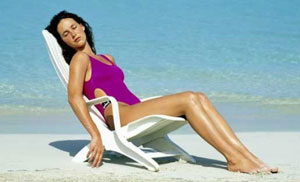Vakantiegeluk

Vacations are a chance to take a break from work, see the worldand enjoy time with family. But do they make you happier?
Researchers from the Netherlands set out to measure the effectthat vacations have on overall happiness and how long it lasts.They studied happiness levels among 1,530 Dutch adults, 974 of whomtook a vacation during the 32-week study period.
The study, published in the
After the vacation, happiness quickly dropped back to baselinelevels for most people. How much stress or relaxation a travelerexperienced on the trip appeared to influence post-vacationhappiness. There was no post-trip happiness benefit for travelerswho said the vacation was “neutral” or stressful.”
Surprisingly, even those travelers who described the trip as”relaxing” showed no additional jump in happiness after the trip.”They were no happier than people who had not been on holiday,”said the lead author, Jeroen Nawijn, tourism research lecturer atBreda University of Applied Sciences in the Netherlands.
The only vacationers who experienced an increase in happinessafter the trip were those who reported feeling “very relaxed” ontheir vacation. Among those people, the vacation happiness effectlasted for just two weeks after the trip before returning tobaseline levels.
“Vacations do make people happy,” Mr. Nawijn said. “But we foundpeople who are anticipating holiday trips show signs of increasedhappiness, and afterward there is hardly an effect.”
One reason vacations don’t boost happiness after the trip mayhave to do with the stress of returning to work. And for sometravelers, the holiday itself was stressful.
“In comments from people, the thing they mentioned most referredto disagreements with a travel partner or being ill,” Mr. Nawijnsaid.
The research controlled for differences among the vacationersand those who hadn’t taken a trip, including income level, stressand education. However, Mr. Nawijn noted that questions remainabout whether the time of year, type of trip and other factors mayinfluence post-vacation happiness.
The study didn’t find any relationship between the length of thevacation and overall happiness. Since most of the happiness boostcomes from planning and anticipating a vacation, the study suggeststhat people may get more out of several small trips a year than onebig vacation, Mr. Nawijn said.
“The practical lesson for an individual is that you derive mostof your happiness from anticipating the holiday trip,” he said.”What you can do is try to increase that by taking more trips peryear. If you have a two week holiday you can split it up and havetwo one week holidays. You could try to increase the anticipationeffect by talking about it more and maybe discussing itonline.”
Mr. Nawijn said that while he expected the study results to showa prevacation happiness boost, he was surprised that the studyshowed that relaxed holidays didn’t affect post-trip happinesslevels.
“People start working again,” he said. “They have to catch up.Usually there is a big pile of work for them when they get backfrom the holiday.”
bron: NYT, 18 februari, sectie
Meest Gelezen
Vrouwen houden universiteit draaiende, maar krijgen daarvoor geen waardering
Hbo-docent wil wel rolmodel zijn, maar niet eigen moreel kompas opdringen
‘Sluijsmans et al. slaan de plank volledig mis’
Wederom intimidatie van journalisten door universiteit, nu in Delft
‘Free riding brengt het hoger onderwijs in de problemen’
